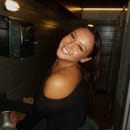Death literacy is dead. Let’s talk about it.
Learning about death, especially the fear of dying, is something I have always found very complicated. It is my most actively avoided therapy topic. I am terrified of dying. This fear has countless reasons starting with the wide range of conversations surrounding the afterlife. The fear of the unknown, coupled with the existential questions about what happens after death, is a discomfort many of us wish to ignore. This has led to a collective silence making us all ill-prepared to navigate the inevitable reality of mortality.
I remember the first time I ever really thought about death. I was in the back of my mom’s car on the way home from swim practice after hearing about the passing of a friend’s grandparent. I don’t think there is ever a good time to learn that your loved ones won’t live forever, but in that moment, I felt like it was completely the wrong time. Having lived with my grandparents most of my life, I never pictured a life without their utmost involvement. My grandfather, specifically, was the most important person in my life. My best friend. Nothing in the world could have prepared me for his passing. I planned on experiencing my life with him by my side. He was supposed to see me graduate. He was supposed to walk me down the aisle. I wasn’t ready to lose him, even if he was ready to go.
It’s worth noting that I felt I was not ready to lose him. Am I selfish for wanting him to be with me forever? It was impossible for me to find any kind of peace in a life without him. Being someone who cannot stand even the topic of death in conversations, I did not know what to do with myself. I am fortunate enough to have been born into a life where losing loved ones was not a constant weight on my shoulders. I had the privilege of neglecting death.
Last week, I learned about death literacy and death positivity in one of my classes. It was an interesting experience that I am extremely grateful for. Accentuated by a class discussion on the docu-horror The Act of Seeing with One’s Own Eyes, the class had to sit in the discomfort of mortality facing the very basic fact of life. We were shown a TED Talk by death doula, Alua Arthur, and then asked to journal throughout as we listened to her talk about “Why Thinking About Death Helps You Live a Better Life.” This was a life-changing moment for me. Listening to Alua discuss her time thinking about life’s end gave me a new perspective on living presently and dying gracefully.
As we wrote down our thoughts and feelings, many people in the class cried — myself included. It made me think about the intentionality of living; and the value of life. Seeing not only my own humanity but that of every other person in the classroom. “Worthiness is our birthright,” said Alua. We all have sacred humanity, yet so many of us choose to live in a way that completely disregards it. Maybe we all need to realize that life is terminal — that we’re all in transition.
When I die, because it will happen one day, I want to be remembered for the person I was. I want to be remembered the way I remember my grandfather. I want my love to be felt even when I am gone.





